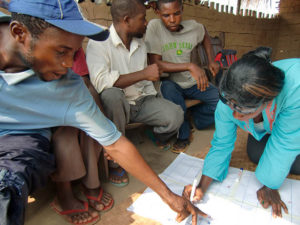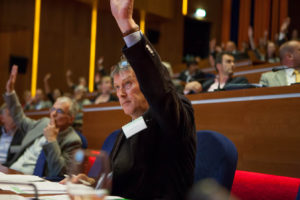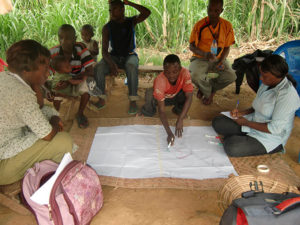
Next year, with the start of Phase 2 of the CGIAR Research Program on Forests, Trees and Agroforestry (FTA), two new managing partners will come on board. One of them is Tropenbos International, a non-governmental organization, based in Wageningen, Netherlands. Its mission is to improve tropical forest governance and management in order to support conservation and sustainable development. We asked René Boot, Director of Tropenbos International since 2002, what joining FTA means for his organization. See more partnerships stories here.
How did you become involved with FTA?
Our relationship with the CGIAR started many years ago, both with the Center for International Forestry Research (CIFOR) and the World Agroforestry Centre (ICRAF), and it developed as we found ever more common ground. Contacts became friendships, collaboration turned into partnership.
The FTA had already involved two organizations from outside the CGIAR, CIRAD and CATIE, in its first phase, and we were invited to become a partner, which acknowledges our work as a ‘boundary organization’.
We found this a fascinating challenge. More than 200 scientists around the world that need to get knowledge to where it is wanted – and they need to hear research questions from the country level. Tropenbos International could help fill that gap, putting scientists in touch with CSOs, ministries, local businesses, we could help to translate messages, transmit knowledge.
We had early discussions with Meine van Noordwijk, Coordinator of the landscapes Flagship of FTA, which led to more detailed talks with then Director Robert Nasi. Finally, in December 2015, we were invited to a meeting in Paris.
In a small room, we presented our interests, our role and theory of change. And we found a clear and common understanding of problems – and possible solutions. More meetings followed in Nairobi and Rome. The final proposal was submitted at the end of July this year, when Tropenbos International was proud to become a managing partner.

What role can a small organization like Tropenbos International play in such a huge program?
Through our country programs and networks built over the past 30 years, Tropenbos International has its feet firmly on the ground, especially in tropical forest countries. We first developed our position as providers of research-based evidence, before we also became knowledge brokers.
One of our roles is to make connections. To link high-level research as in the FTA Research Program with national-level policies and landscape-level practices.
We aim to ensure that the FTA Program makes an impact at the country level—so that research results can be translated into solid outcomes. But also, and very importantly, we will act as a conduit in the other direction. We are in close and regular contact with a range of actors. They talk to us. And we listen.
We have for example, successfully established multi-stakeholder dialogues in a number of countries. And we can share our experiences in how we have adapted such processes to the different social and political environments we work in.

At the level of national governments, Tropenbos International has very good relationships in half a dozen countries, and good connections in half a dozen more, built on trust and respect over many years.
And our role in a new partnership program with the Dutch Ministry of Foreign Affairs adds another dimension to our work. This program aims to strengthen the capacity of civil society organizations to lobby and advocate for inclusive governance and sustainable management of forested landscapes. In this five-year program we work together with the International Union for Conservation of Nature (IUCN) NL and Friends of the Earth NL.
We articulate the needs, wishes and demands from a wide range of actors at the national level. These are related to gaps in knowledge, and honed into research questions. These questions, when channelled to FTA, will help in setting a demand-led agenda for action, and that is highly relevant to country needs, which it must be if it is to have any real chance of having an impact. This we see as one of our crucial roles.

What do you expect of the next phase of FTA research?
Phase 2 is due to start in January 2017, and we are ready to begin in our role as a knowledge broker—an honest knowledge broker.”
I very much appreciate the scope of the second phase, including livelihoods and landscapes, trade and value chains, climate change and genetic resources. All of them are key issues. The elements are there and we have to combine them.
In the first phase, CGIAR institutes worked with CATIE and CIRAD, and now adding Tropenbos International and the International Network for Bamboo and Rattan (INBAR). The partnership is growing. And we have a joint responsibility for a major program.
I see much more interaction, more integration, and a very strong interest in working together—and in making this work!
Our goal now, for the next five years, is to contribute to resolving some of the perennial challenges the world faces. And we can only do that together.
As a global network of international organizations, the CGIAR and its research programs undertake excellent research, is well respected and has much influence in the international forest and development arena. But real impacts on the ground also require influence at the level of governments and ministries responsible for national policy and practice. And that’s where we come in.
Long-term relationships and mutual trust—partnerships and research on climate change
The best science is nothing without local voices: Partnerships and landscapes
Influence flows both ways: Partnerships are key to research on Livelihood systems











